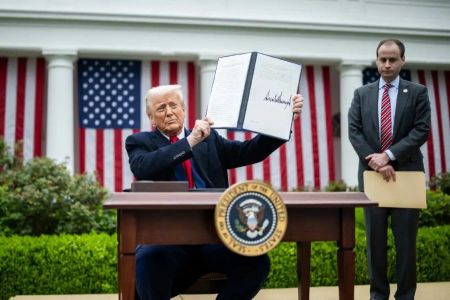Annexation Talk, Economic Shock, and a Divided America: How the World Reacts to Trump’s Second Term
DONALD TRUMP, who has just completed 100 days in office during his second term as President of the United States, has demonstrated how one individual can impact the world through his actions and influence the destiny of millions.
Undoubtedly, he remains the most powerful person in the most powerful country, but none of his predecessors has created as much disruption as he has at the beginning of his second term.
The latest consequence—though perhaps not to Trump’s own liking—is the victory of the Liberal Party in Canada, where Prime Minister Mark Carney has returned to power with a stronger majority. This was largely thanks to Trump’s provocative declaration that he would like Canada to become the 51st state of the United States.

Liberal Party’s Mark Carney returns to power in Canada after a surprise surge driven by nationalist backlash to Trump’s annexation remarks.
Trumps’s threat to annex Canada evidently galvanized support for the Liberals, whose popularity had plummeted during the tenure of Justin Trudeau, who had locked horns with both Trump and India.
At one point, a Liberal defeat seemed inevitable, but a surge of nationalist fervour and anger toward Trump helped the party stage a comeback.
There is no doubt that, after the initial weeks when he and his administration were making headlines globally with outrageous decisions and comments, Trump has slowed down and even hinted at reversing some controversial policies in recent days.
One such decision was the imposition of sweeping tariffs, with China being the primary target. The sharp retaliation by China—the world’s second-largest economy—was perhaps not anticipated by Trump. Recently, he admitted that the 245 per cent tariff he had announced against China was “too high” and stated that he would reconsider it.

He has also paused the imposition of higher tariffs on other countries for a period of three months and has agreed to hold negotiations to reach mutually beneficial trade agreements.
This climbdown was evidently forced by growing public resentment within the United States, where citizens had begun to feel the pinch of inflation.
Demonstrations erupted across the country, and there were even calls to boycott Tesla cars, produced by Trump’s favourite entrepreneur, Elon Musk. Clearly, Trump had shot himself in the foot—a literal translation of a Hindi idiom.
Musk, who had been tasked with improving governmental efficiency, had instead rendered a large number of citizens jobless. For them, it was a double whammy: losing their jobs while also dealing with rising inflation.

Trump’s other major announcements—such as ending the Russia-Ukraine war and the Israel-Hamas conflict—have also fallen flat. His lengthy conversations with Russian President Putin and threats to Ukrainian President Zelenskyy have produced no results. Neither have his warnings to Israel and Hamas or his suggestion of taking over the Gaza Strip had any effect.
Another key decision involved illegal immigration. His initial show of force—deporting migrants in chains and shackles aboard US Air Force aircraft—has since been toned down.
His declaration that he would revoke visas for both skilled and unskilled foreign workers and reserve jobs exclusively for American citizens also provoked backlash from corporations that rely on such labour.
India has, so far, wisely maintained a measured stance by neither reacting nor retaliating to Trump’s announcements. Allowing him time to calm down and adopt a more realistic approach seems prudent.
 It is clear that many of his extreme positions are meant to appease his core supporters, as reflected in various opinion polls conducted at the end of his first 100 days in office.
It is clear that many of his extreme positions are meant to appease his core supporters, as reflected in various opinion polls conducted at the end of his first 100 days in office.
These surveys suggest that public opinion in the U.S. is now more divided than ever. While many Americans believe he is performing slightly better than he did at the same point in his first term, criticism persists on issues such as the economy, government spending, and immigration.
On the day Trump was re-elected, I happened to be with Navtej Sarna, who had served as India’s ambassador to the United States during Trump’s first term. Asked to comment on the development, he said succinctly: “The world has to learn to live with Trump.” Nothing could be more true. ![]()
_______
Also Read:
US-Saudi Arabia Set for Historic Arms Deal
Disclaimer : PunjabTodayNews.com and other platforms of the Punjab Today group strive to include views and opinions from across the entire spectrum, but by no means do we agree with everything we publish. Our efforts and editorial choices consistently underscore our authors’ right to the freedom of speech. However, it should be clear to all readers that individual authors are responsible for the information, ideas or opinions in their articles, and very often, these do not reflect the views of PunjabTodayNews.com or other platforms of the group. Punjab Today does not assume any responsibility or liability for the views of authors whose work appears here.
Punjab Today believes in serious, engaging, narrative journalism at a time when mainstream media houses seem to have given up on long-form writing and news television has blurred or altogether erased the lines between news and slapstick entertainment. We at Punjab Today believe that readers such as yourself appreciate cerebral journalism, and would like you to hold us against the best international industry standards. Brickbats are welcome even more than bouquets, though an occasional pat on the back is always encouraging. Good journalism can be a lifeline in these uncertain times worldwide. You can support us in myriad ways. To begin with, by spreading word about us and forwarding this reportage. Stay engaged.
— Team PT

